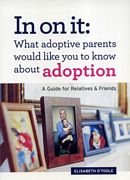 Do you ever wish adoption came with an operating manual?
Do you ever wish adoption came with an operating manual?
I sure do. When I first started the process, there were times when I didn’t know if I was coming or going. One moment adoption was this thing that happened to other people. The next thing I knew it was happening to me.
I didn’t know what was scarier–beginning our home study or explaining it to my family. At that point, our adoption plan was still in its formative stages. There was no guarantee it was going to work–or even how it would work.
Adoption support is important
Finding support was important. But I didn’t know how to share our news. I knew my parents and siblings would have questions, and I didn’t have the answers. Looking back, I understand their concern. They were just being protective, reacting to the same information (read: horror stories) that I had when I started. And yet the last thing I needed was one more thing to add to my uncertainty. I wanted them to come on the journey with me.
Too bad Elisabeth O’Toole’s terrific book, In On It, wasn’t around back then. In no time, we could all have gone from “out of it” to “in on it” and saved ourselves a whole bunch of trouble. Then again, who knows whether my journey would have been as sweet without all of the awkward pauses, misunderstandings and missed opportunities I encountered along the way.
In On It is a great title for a book about a topic as complicated and confusing as adoption. But just so that nobody misses its central message, its subtitle boils it down to two simple sentences: “What Adoptive Parents Would Like You To Know About Adoption. A Guide for Relatives and Friends.”
Described as the “adoption book for everyone else,” In On It is aimed at helping your loved ones better understand the process and what it means to you. Told with grace, humor and honesty, it should be essential reading for any one at any stage of their journey.
Answers to your adoption questions
Inside you’ll find answers to just about any question or scenario you or your loved ones might run into, from dealing with nosy people at the grocery store (Chapter 1) to coping with the challenges of being a transracial family (Chapter 4) to talking to non-adoptive children about adoption (Chapter 8). What’s more, each chapter comes with a list of actionable steps to navigate the hurdles along the way and there’s even a a list of conversations starters at the back of the book.
O’Toole is a wise and generous guide. The way she sees it, most misunderstandings about adoption stem from ignorance. People mean well, but sometimes they just screw up. And that’s okay since they’re human just like you. You can educate them or you can walk away. And she makes it easy for you to do both by supplying the tools and technique to deal with a wide range of situations.
At the same time, In On It doesn’t shy away from dealing with sensitive subjects such as loss (which, as O’Toole rightly explains, is one of the main things that differentiates adoptive families from other families) and the birthparent and adoptee experience. I can’t tell you how many times I found himself nodding in agreement or sinking deeper into my chair from embarrassment as I recognized myself in her scenarios. As with the best of books, I felt that this one was written especially for me.
And yet as good as her advice and suggestions are about how others can become more involved in and supportive of your adoption story, the real strength of the book lies in O’Toole herself. An adoptive mother of three through international adoption, she doesn’t let herself off the hook. Instead, she draws on her own experiences as an adoptive mother and a mother-in-training to illustrate her points.
Needless to say, it wasn’t always a smooth ride: “I remember being surprised by how often I was asked to explain both our decision to adopt and adoption in general…People unfamiliar with adoption advised us that our adoptive children would likely be unhealthy, because their birthmothers would be on drugs, alcoholic or HIV positive.”
Becoming an adoption advocate
And that doesn’t even touch on the responses she got from her immediate circle. Adoption is a private, intimate matter. But, as O’Toole shows, things have a way of getting really messy really quickly once it goes public.
That’s why, whether we like it or not, all of us eventually find ourselves stepping into the role of advocate — first for ourselves, then for our children. After all, you can’t expect others who haven’t undergone the education and training that we have to understand all of the issues involved in becoming an adoptive parent. Every adoption comes with a huge learning curve. Sometimes, when we go through the placement process, we forget just little we knew when we started it.
For this reason, O’Toole says we shouldn’t just share what we’ve learned with our family and friends, we have an obligation to do so. After all, adopting a child is a life-altering decision–one that not only affects our life and our child’s life, but also our relationship with those closest to us.
O’Toole says when she started out, she needed a book that would introduce her loved ones to how adoption worked and address their needs and concerns. In On It is the book she wished she had. And the one I wish I had, too. Adoption isn’t for everyone. But everyone who wants to deepen their understanding and relationships should get a copy of O’Toole’s book. It’s that good.
Did you find it hard to explain adoption to your family and friends? What kind of reaction did you get? What advice do you have for others? Leave your comments in the section below.
